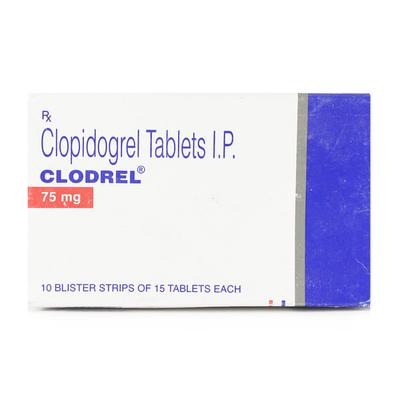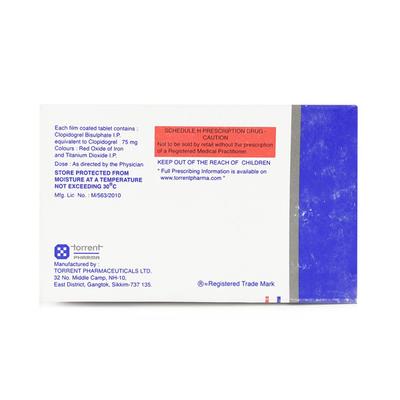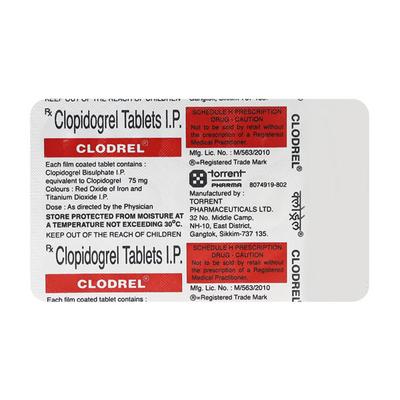

Netmeds First Membership
Quick Links
INTRODUCTION ABOUT CLODREL TABLET
CLODREL TABLET contains Clopidogrel which belongs to the group of medicines called Antiplatelets. CLODREL TABLET is used to manage blood clots (thrombi) due to atherothrombosis which may lead to atherothrombotic events such as stroke or heart attack and atherosclerotic events (myocardial infraction) in patients with atherosclerosis. It is also used to manage in-stent restenosis in patients undergo percutaneous coronary Intervention (PCI).
Platelets are very small structures in the blood which clump together during blood clotting. By managing this clumping, antiplatelet medicinal products reduce the chances of blood clots forming (a process called thrombosis).
Atherothrombosis is an inflammatory process of the arteries that affects the coronary (heart), cerebral (brain) and peripheral circulation (blood circulation to arms, hands, legs and feet) by aberrant thickening of the blood vessel wall and reducing the blood flow to the tissue that triggers the occurrence of myocardial infarction, stroke and peripheral arterial disease.
Along with this management, your doctor may advise regular blood tests to check your blood clotting time.
Avoid taking CLODREL TABLET, if you are allergic to Clopidogrel or have a medical condition that is currently causing bleeding such as a stomach ulcer or bleeding within the brain, severe liver disease.
Before taking CLODREL TABLET, inform your doctor if you are at a risk of internal bleeding, have or ever had a clot in artery of your brain (ischemic stroke) which might have occurred within the last seven days or have heart or kidney problems.
CLODREL TABLET is not recommended for use in pregnant and breastfeeding women. It is not recommended for use in children and adolescents (below 18 years of age). Consult your doctor before taking CLODREL TABLET.
The most common side effects of taking CLODREL TABLET are bleeding, diarrhea, abdominal pain, indigestion and heartburn. Consult your doctor if any of these above symptoms gets worse.
USES OF CLODREL TABLET
It is used to:
- prevent blood clots (thrombi) forming in hardened blood vessels (atherothrombosis)
- manage atherosclerotic events (myocardial infraction)
- prevent in-stent restenosis in patients undergo percutaneous coronary intervention (PCI)
HOW CLODREL TABLET WORKS
CLODREL TABLET works by managing platelets from sticking together, thereby decreasing the formation of harmful blood clots that results in the lower chance of occurrence of heart attack or stroke.
DIRECTIONS FOR USE
Take CLODREL TABLET as advised by your physician. Swallow CLODREL TABLET with a glass of water and do not chew or crush the medicine. Your doctor will decide the correct dose and duration for you depending upon your age, body weight and disease condition.
SIDE EFFECTS OF CLODREL TABLET
COMMON
- bleeding inside the head, lungs, stomach, bowels, eyes or joints
- nosebleed
- bruising
- haematoma (unusual bleeding or bruising under the skin)
- blood in the urine
- diarrhea
- abdominal pain
- indigestion
- heartburn
UNCOMMON
- headache
- stomach ulcer
- vomiting
- nausea
- constipation
- excessive gas in stomach or intestines
- rashes
- itching
- dizziness
- sensation of tingling and numbness
RARE
- enlarged breasts in males
Stop taking CLODREL TABLET and contact your doctor immediately if you experience any of the following side effects:
- signs of thrombotic thrombocytopenic purpura such as fever, whether or not associated with bleeding which appears under the skin as red pinpoint dots, with or without unexplained extreme tiredness and confusion
- signs of liver problems such as yellowing of the skin and/or the eyes (jaundice)
- signs of allergic skin reaction such as swelling in the mouth, rashes, itching and blisters of the skin
HOW TO MANAGE SIDE EFFECTS
Constipation
Try to eat more high-fiber foods such as fresh fruit, vegetables, cereals and drink plenty of water. If this does not help, inform your doctor for receiving alternate managements for constipation.
Diarrhea
Drink lots of fluids, such as water to keep yourself hydrated. Try to avoid taking any medicine on your own to manage diarrhea and consult your doctor if the symptom gets worse.
Dizziness Or Drowsiness
Try to rest and relax and get enough sleep. Try to avoid driving or operating any tools or machines while you are feeling dizzy. Limit your consumption of alcohol, as it can aggravate your dizziness. Consult and inform your doctor if the symptom does not improve.
Headache
If CLODREL TABLET causes headache, then take rest and drink plenty of fluids. Try to avoid drinking alcohol. Ask your doctor to recommend a painkiller. Headaches should usually go away after the first week of taking CLODREL TABLET. If headaches last more than a week or severe, inform your doctor.
Indigestion
Try to have smaller and more frequent meals and reduce consumption of tea, coffee, cola or alcohol and lose weight if you are obese. Avoid smoking and do not have rich, spicy or fatty foods. Consult and inform your doctor if the symptom does not improve.
Nausea And Vomiting
Try to take CLODREL TABLET with or just after a meal or a snack. Stick to simple meals. Avoid eating rich or spicy food. Consult your doctor if the symptom gets worse.
WARNING & PRECAUTIONS
PREGNANCY
ContraindicatedCLODREL TABLET is not recommended for use in pregnant women. Consult your doctor before taking CLODREL TABLET.
BREASTFEEDING
ContraindicatedCLODREL TABLET is not recommended for use in breastfeeding women. Consult your doctor before taking CLODREL TABLET.
DRIVING AND USING MACHINES
Use with CautionCLODREL TABLET is unlikely to affect your ability to drive or to use machines. Consult your doctor before taking CLODREL TABLET.
KIDNEY
Use with CautionCLODREL TABLET should be used with caution in patients with kidney disease. Consult your doctor for advice before taking CLODREL TABLET.
LIVER
Consult your doctorCLODREL TABLET is not recommended for use in patients with severe liver disease and it should be used with caution in patients with liver disease. Consult your doctor for advice before taking CLODREL TABLET.
ALLERGY
ContraindicatedDo not take CLODREL TABLET if you are allergic to Clopidogrel or to any other ingredients of this medicine. Consult your doctor before taking CLODREL TABLET.
USE IN PEDIATRICS
ContraindicatedCLODREL TABLET is not recommended for use in children because it does not work. Consult your doctor for advice.
USE IN GERIATRICS
Use with CautionCLODREL TABLET should be used with caution in elderly patients (aged 65 years or above). Consult your doctor before taking CLODREL TABLET.
OTHERS
CLODREL TABLET is not recommended for use if you:
- have a medical condition (such as a stomach ulcer or bleeding within the brain)
Before taking CLODREL TABLET, inform your doctor if you:
- have a risk of bleeding such as internal bleeding (Ex. stomach ulcer, bleeding inside any tissues organs or joints of your body)
- had recent serious injury, surgery (including dental)
- have a planned surgery (including dental) in the next seven days
- have or had a clot in an artery of your brain (ischemic stroke) which occurred within the last seven days
- had a past medical history of non-traumatic brain hemorrhage (condition marked by bleeding inside brain in the absence of trauma or surgery)
INTERACTIONS
A. Drug-Drug interactions:
Before taking CLODREL TABLET, inform your doctor, if you are taking any of the following medicine:
- oral anticoagulants (medicines used to reduce blood clotting) such as dabigatran, rivaroxaban, apixaban
- non-steroidal anti-inflammatory drugs (medicines used to manage painful and/or inflammatory conditions of muscle or joints) such as ibuprofen, naproxen, diclofenac
- injectable medicine used to reduce blood clotting (Ex heparin, enoxaparin)
- antiplatelet agent (medicine used to manage formation of blood clot) Ex. ticlopidine
- medicines used to manage depression (Ex. fluoxetine, fluvoxamine, moclobemide)
- rifampicin (medicine used to manage severe infections)
- omeprazole or esomeprazole (medicines used to manage stomach upset)
- fluconazole or voriconazole (medicines to manage fungal infections)
- antiretroviral drugs (medicines used to manage HIV infections) Ex. efavirenz, atazanavir, darunavir, fosamprenavir
- carbamazepine (medicine to manage some forms of epilepsy)
- repaglinide (medicine used to manage diabetes)
- paclitaxel (medicine used to manage cancer)
- medicines used to manage severe pain (Ex. oxycodone, hydrocodone, codeine)
Overdosage:
If you or anyone else accidentally takes too much of CLODREL TABLET, consult your doctor immediately or visit the nearby hospital. Overdosage may lead to increased risk of bleeding.
SYNOPSIS
| Drug | : | Clopidogrel |
| Pharmacological Category | : | Antiplatelets |
| Therapeutic Indication | : | Manages Atherothrombosis, atherosclerotic events and manages in-stent restenosis in patients undergoing percutaneous coronary intervention (PCI) |
| Dosage Forms | : | Tablet |
MORE INFORMATION
- Keep the medicine out of reach in children
- Store CLODREL TABLET at room temperature
FAQs ABOUT CLODREL TABLET
Q: What CLODREL TABLET is used for?
A: CLODREL TABLET is used in adult patients to manage blood clots (thrombi) due to atherothrombosis (condition marked by formation of blood clot within an artery) which leads to atherothrombotic events such as stroke or heart attack.
Q: How should CLODREL TABLET be taken?
A: Take CLODREL TABLET as advised by your physician. Swallow CLODREL TABLET with a glass of water and do not chew or crush the medicine. Your doctor will decide the correct dose and duration for you depending upon your age, body weight and disease condition.
Q: What are the side effects of CLODREL TABLET?
A: The most common symptoms of taking CLODREL TABLET are bleeding, diarrhea, abdominal pain, indigestion and heartburn. Consult your doctor if any of these symptoms gets worse.
Q: Who should avoid taking CLODREL TABLET?
A: CLODREL TABLET is not recommended for use in patients allergic to Clopidogrel, have a medical condition that is currently causing bleeding such as a stomach ulcer or bleeding within the brain or severe liver disease.
Q: Is CLODREL TABLET safe to use in children?
A: CLODREL TABLET is not recommended for use in children since the medicine does not work in this population. Consult your doctor before taking CLODREL TABLET.
REFERENCES
1. KD. Tripathi. Drugs Affecting Coagulation, Bleeding and Thrombosis. Seventh edition. 2013. Page – 630.
2. Mylan Pharmaceuticals. Food Study of Clopidogrel Bisulfate Tablets 75 mg to Plavix Tablets 75 mg. NIH U.S. National Library of Medicine ClinicalTrials.gov. [Revised in April 2008] [Accessed on 31st May 2022] https://clinicaltrials.gov/ct2/show/NCT00650169
3. Craig J. Beavers; Imama A. Naqvi. Clopidogrel. NIH National Library of Medicine, National center for biotechnology information. May 2022 [Accessed on 31st May 2022] https://www.ncbi.nlm.nih.gov/books/NBK470539/
4. Peng-Xin Ge , Li-Ping Jiang , Ting Tai , Ting Zhu , Jin-Zi Ji , Yi-Fei Li , Qiong-Yu Mi , Hong-Guang Xie. Short-term standard alcohol consumption enhances platelet response to clopidogrel through inhibition of the Nrf2/Ces1 pathway and induction of Cyp2c in mice. NIH National Library of Medicine, National center for biotechnology information. PubMed.gov. August 2021 [Accessed on 31st May 2022] https://pubmed.ncbi.nlm.nih.gov/33626394/
5. Matthew T Roe , Shaun G Goodman, E Magnus Ohman, Susanna R Stevens, Judith S Hochman, Shmuel Gottlieb, Felipe Martinez, Anthony J Dalby, William E Boden, Harvey D White, Dorairaj Prabhakaran, Kenneth J Winters, Philip E Aylward, Jean-Pierre Bassand, Darren K McGuire, Diego Ardissino, Keith A A Fox, Paul W Armstrong. Elderly patients with acute coronary syndromes managed without revascularization: insights into the safety of long-term dual antiplatelet therapy with reduced-dose prasugrel versus standard-dose clopidogrel NIH National Library of Medicine, National center for biotechnology information. PubMed.gov. August 2013 [Accessed on 31th May 2022] https://pubmed.ncbi.nlm.nih.gov/23852610/
6. APL Swift Services (Malta) Limited. Electronic medicines compendium (EMC). [Revised in March 2021] [Accessed on 31st May 2022] https://www.medicines.org.uk/emc/files/pil.5207.pdf
7. Sanofi Winthrop Industrie. Electronic medicines compendium (EMC). [Revised in September 2021] [Accessed on 31st May 2022] https://www.medicines.org.uk/emc/files/pil.5934.pdf
USEFUL DIAGNOSTIC TESTS
- Complete blood count
- Liver function tests









